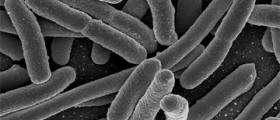
E. coli 0157:H7 is a gram negative bacterium that is mostly responsible for severe bloody diarrhea that occurs when a bacterium produces and secretes toxins, upon infecting the human gastrointestinal tract. This bacterium has the ability to survive even without the air, in both aerobic and anaerobic environment. There are many strains of Escherichia coli and some of them are normally found in large intestines of a healthy human. E. coli 0157:H7 is one of the notorious strains of Escherichia coli that is often associated with severe health problems, complications, and even renal failure, anemia and death from dehydration.
Symptoms of E. coli 0157:H7
The first symptoms of E. coli 0157:H7 infection are not visible immediately after a person is exposed to contaminated food, water or surfaces. Typically, it will take between three and five days before the symptoms start to show up. In some cases, about 10 days can pass from a moment of digestion of bacteria, before the symptoms appear. First symptoms are usually distinguished by extreme sickness, vomiting, abdominal cramps and often bloody diarrhea. The symptoms are generally the same in both kids and adults. Most of the patients will also have a mild fever that ranges anywhere between 37.7 to 38.3 C (100 to 101F).
In most cases, the infection resolves on its own in about five to seven days. Typically, people will not even need any kind of medical treatment. However, in some cases the infection may be more severe and require hospitalization followed by treatment that is more aggressive. Patients at the highest risk of complications are elderly people and children under the age of five.
When to Seek Medical help
People are advised to seek medical help whenever they have visible signs of dehydration. For example, if a person has decreased urination, dry mouth and mucus membranes, it is about time to seek professional help and replenish lost fluids. Parents and caregivers of young children and older adults are also advised to consult their medical care providers, even if they have milder symptoms. Any kind of presence of blood in the stool is also an alarming symptom. Sometimes this feature may indicate the presence of some other, possibly serious ailment.
Sometimes it is even possible to prevent the disease or control the way it develops. This applies to those cases when people know they have ingested food or liquids contaminated with E. coli 0157:H7, or that they have been in close contact with other infected people. These individuals should seek medical care and prevent any further health problems.

















Your thoughts on this
Loading...